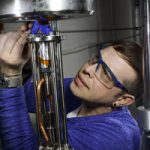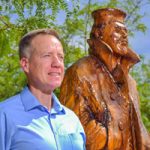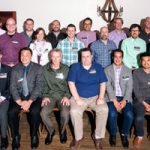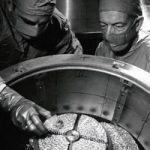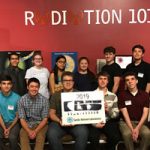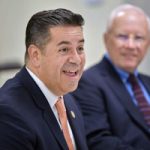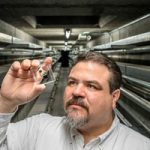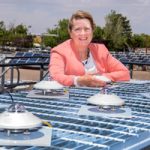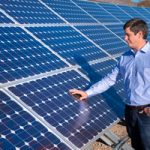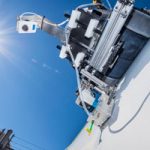Hydrogen materials service advanced by new multilab consortium
Researchers at Sandia and Pacific Northwest national laboratories are leading a collaborative effort to investigate how hydrogen affects materials such as plastics, rubber, steel and aluminum. The Hydrogen Materials Compatibility Consortium, or H-Mat, will focus on how hydrogen affects polymers and metals used in diverse sectors, including fuel cell transportation and hydrogen infrastructure.
Dave Clovis awarded Defense Meritorious Service Medal
In February, Sandia engineer and U.S. Navy Reserve Cmdr. Dave Clovis was awarded the Defense Meritorious Service Medal for distinguishing himself by exceptionally meritorious achievement as an engineer for a Joint Task Force operation.
Praising Sandia’s culture of innovation
Sandia hosted its annual Innovation Celebrations in Livermore and Albuquerque May 16 to recognize the Labs' innovators. The celebration honored individuals who received patents, copyrights or licensed royalties, or created other intellectual property in 2018.
Man on the moon
On July 20, 1969, nearly 650 million people watched as Neil Armstrong took “...one small step for a man, one giant leap for mankind,” when the Apollo 11 mission landed the first man on the moon. This year marks the 50th anniversary of that mission, and Sandia was part of the team.
STAR fellows 2019
Family Day memories are captured in photos from past events.
Steve Younger joins roundtable to expand trades in New Mexico
Labs Director Steve Younger met with New Mexico 3rd District Congressman Ben Ray Luján at a recent forum to discuss the ACCESS Act, which would establish a five-year grant program run by DOE to create apprenticeship and pre-apprenticeship programs in colleges and technical education schools to fill nuclear industry jobs at national laboratories.
Portable gas detection shrinks to new dimensions
A sensor for detecting toxic gases is now smaller, faster and more reliable, thanks to researchers at Sandia. The sensor’s performance sets it up for integration into a highly sensitive, portable system for detecting chemical weapons. The sensors can also rapidly detect airborne toxins.
Global collaboration to study photovoltaic performance, reliability
An international community of research institutions, led by Sandia, to advance photovoltaic research and expand solar markets formally launched its work on May 14 in Munich, Germany. The organization provides a unique platform for studying photovoltaic performance and reliability in multiple, diverse environments and climates.
Rooftop solar panels get boost from Sandia tool
Homeowners and businesses may now have an easier time getting solar panels on rooftops thanks to software developed at Sandia. The new software can run a detailed, second-by-second simulation that shows utility companies how rooftop solar panels at a specific house or business would interact with a local electrical grid throughout the year.
Don’t set it and forget it — scan it and fix it with tech that detects wind blade damage
Drones and crawling robots outfitted with special scanning technology could help wind blades stay in service longer, which may help lower the cost of wind energy at a time when blades are getting bigger, pricier and harder to transport, Sandia researchers say.
